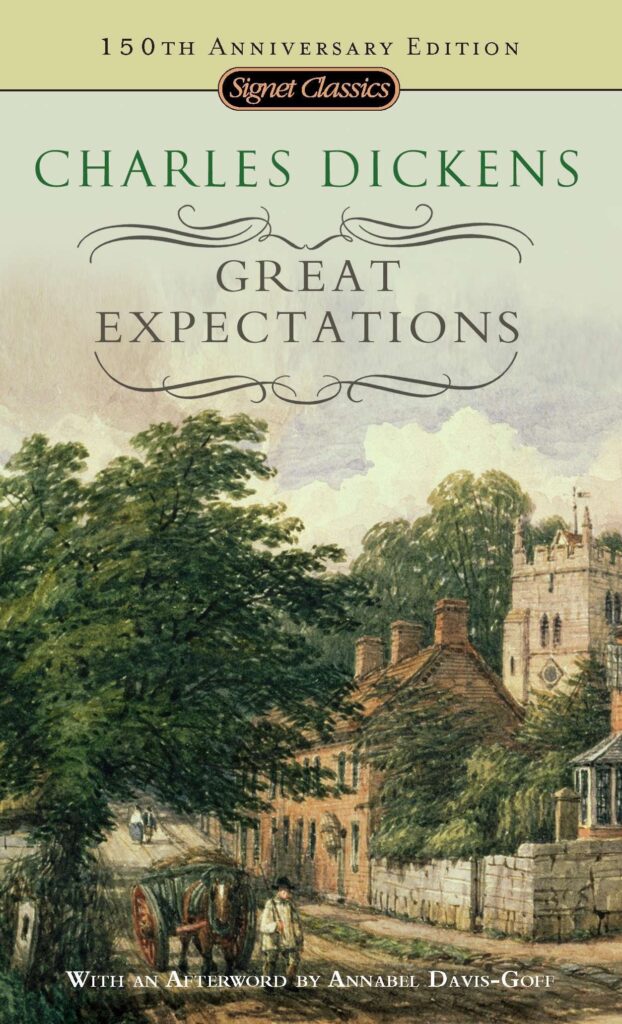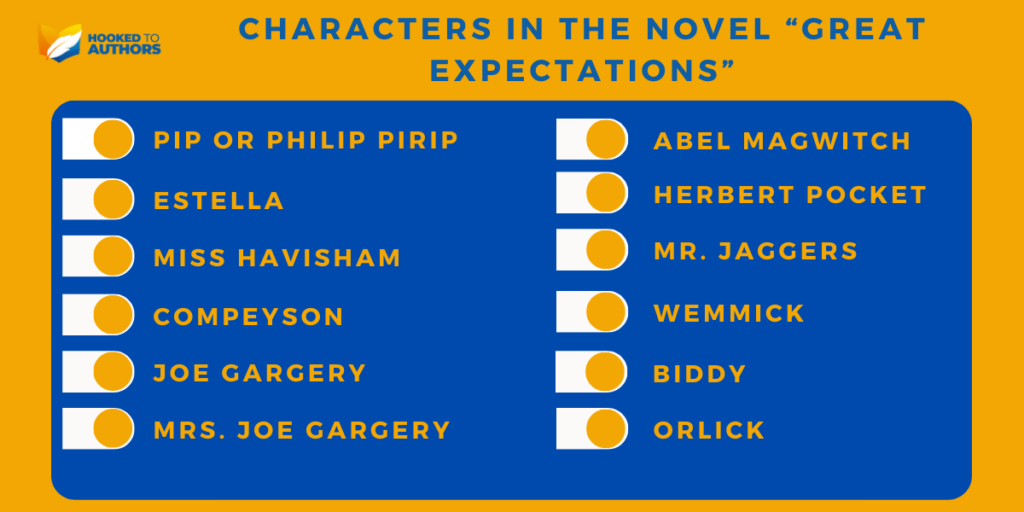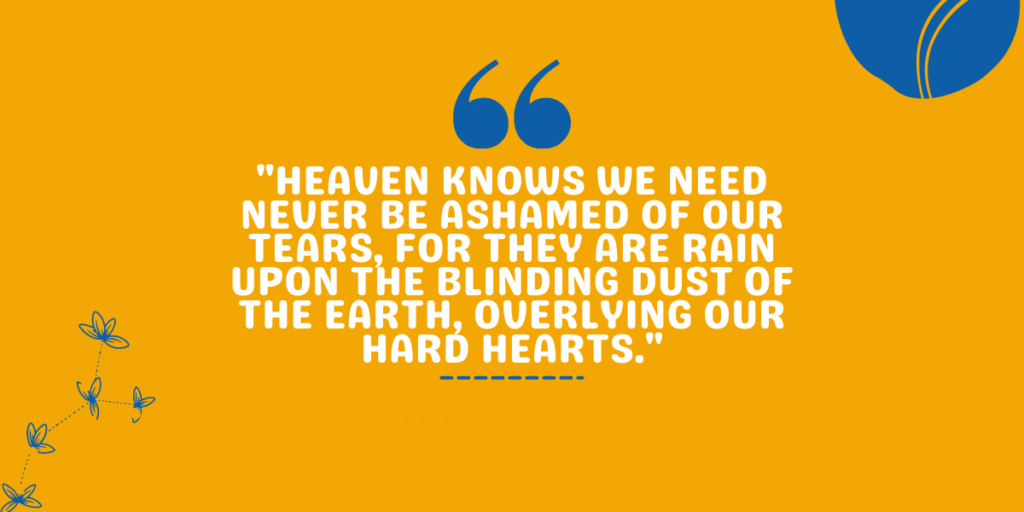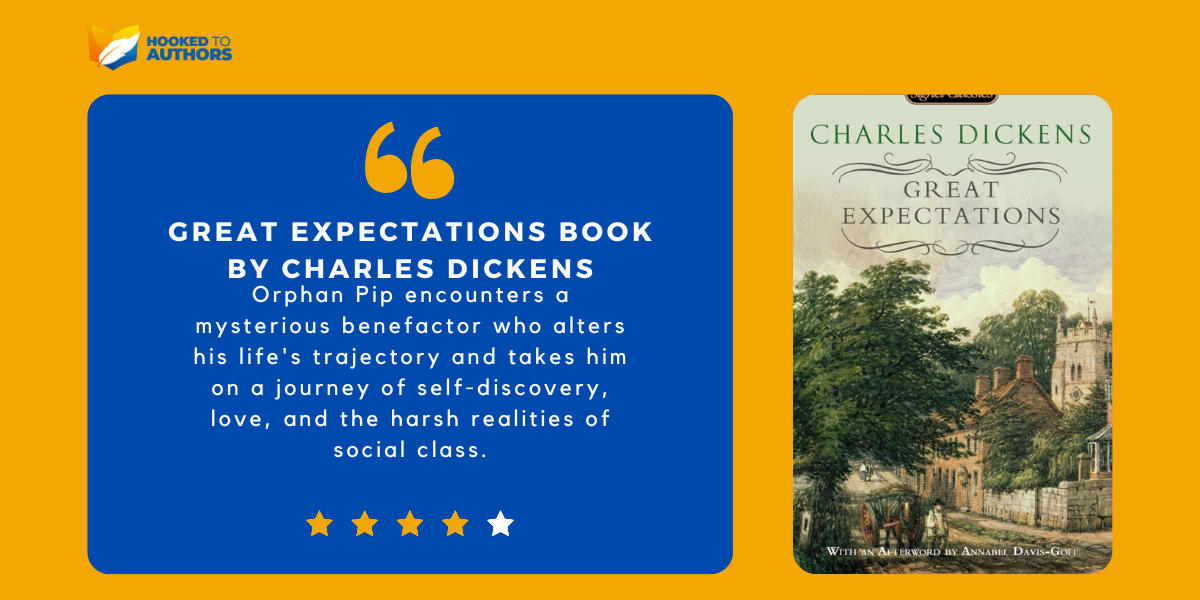Great Expectations is Charles Dickens’ most celebrated book of his life. This classic novel was one of its author’s greatest critical and popular successes. It’s due to Dickens’s understanding of human nature and his ability to illuminate the misery of English poverty in the 19th century. First published as a series from 1860 to 1861 and then in three volumes in 1861, Great Expectations is a timeless masterpiece.
The title of the novel Great Expectations mainly refers to Pip, the protagonist’s desire for self-improvement. It’s because he believes in the possibility of advancement in life and has “great expectations” about his future.
Great Expectations is regarded as a Victorian bildungsroman. The work is a remarkable example of the bildungsroman or coming-of-age novel. Pip, the main character, transforms from a blacksmith’s apprentice to a gentleman. It’s typical of the bildungsroman, in which the protagonist goes through a development process.
Charles Dickens became one of his era’s most widely read and prolific authors. He is still regarded as the pinnacle of English literature. Dickens’ works were supplemented by understanding his society and its flaws. He became a prominent literary personality of the 19th century due to this. He also became a powerful representative of his generation’s conscience.
Great Expectations draws attention to the novel’s examination of the themes of ambition and identity. It outlines the influence of social class on personal aspirations. It also talks about overlooking the value of interpersonal relationships and moral principles. It also suggests the perils of losing touch with one’s true self.
| Title | Great Expectations |
|---|---|
| Author | Charles Dickens |
| Publication Date | 1861 |
| Genre | Bildungsroman, social commentary, historical fiction |
| Setting | Primarily in England during the early 19th century |
| Protagonist | Philip "Pip" Pirrip |
| Antagonist | Abel Magwitch and Miss Havisham (indirectly) |
| Major Themes | Social class, wealth, ambition, love, guilt, redemption |
| Plot Summary | Pip, an orphan raised by his abusive sister and her husband, is asked to visit a wealthy, reclusive woman named Miss Havisham to play with her adopted daughter, Estella. Pip falls in love with Estella and becomes obsessed with becoming a gentleman to win her affection. He receives unexpected wealth from an anonymous benefactor and moves to London to pursue his dream of being a gentleman. However, he learns the true identity of his benefactor and realizes that his obsession with wealth and status has blinded him to the people who truly care for him. |
| Major Characters | Pip, Estella, Miss Havisham, Abel Magwitch, Joe Gargery, Herbert Pocket |
| Literary Significance | Great Expectations" is considered one of Dickens' greatest works and a masterpiece of Victorian literature. It explores themes of social class and ambition while also offering commentary on the justice system, education, and gender roles. The novel's use of symbolism, particularly in the character of Miss Havisham, is also notable. |

The story follows the life of an orphan named Pip. Pip lives with his abusive sister, Mrs. Joe, and her blacksmith husband, Joe Gargery, in a small village in Kent. The narrative begins with an alarming scene at a cemetery. Abel Magwitch is a prisoner who escaped from custody while wearing his chains. He is hiding in the neighboring wetlands when Pip, the protagonist, comes to him there. Pip helps the wanted Magwitch escape his assailants by giving him a file and food.
Soon after, Pip finds himself in another odd situation when he agrees to entertain Madam Havisham at Satis House. He meets Havisham. She is a deranged woman who is still dressed in her bridal gown in the room, which is dark, and has a moldering wedding cake in the shadows. Every clock is set to the same time, which is the hour Miss Havisham’s fiance abandoned her after they were supposed to get married. Despite the strange circumstances, Pip falls in love with Miss Havisham’s adopted daughter, Estella.
Since Pip comes from such a lowly background, it goes without saying that the match is impossible. Also, it is impossible since Havisham, out of retaliation, influenced Estella. She taught her how to entice young men to fall in love with her so that she might reject them in the same way that Havisham was rejected. Pip wants to wed Estella to elevate his social position, but Estella is cold and distant. Pip is confident that if he becomes a gentleman, he can convince Estella to change her mind despite her refusal.
When Mr. Jaggers, a lawyer, tells Pip that he has received money from an unnamed benefactor, Pip assumes that Miss Havisham is the giver. Miss Havisham lets Pip assume this and does not refute this assumption. Pip also thinks the money will enable him to earn Estella’s affection.
Pip relocates to London to pursue his dream of winning Estella’s heart. Once in London, Pip learns to be a gentleman under the tutelage of Herbert Pocket and his father, Matthew. He also acquired knowledge from Estella’s suitor Bentley Drummle. As Pip rises to the social scale, he gradually loses touch with his low beginnings. He begins to think highly of himself in comparison to others.
The tale’s second half is one of the revelations as Pip learns the appalling truth about his benefactor. His social advancement has been funded by Magwitch rather than Madam Havisham. The money and the expectations, which had once appeared like a dream come true, have changed from being a dream to a burden that threatens to ruin his life.
Pip resolves to leave England. Since he believes his affiliation with Magwitch jeopardizes his social standing. Pip confronts Miss Havisham about lying about being his benefactor as he visits her and Estella before leaving. In addition, he confesses his love for Estella. Having committed to marrying Bentley Drummle, she rejects Pip.
Further shocking information reveals that Magwitch is Estella’s father. Furthermore, Compeyson, Miss Havisham’s erstwhile love interest, is Magwitch’s unscrupulous business partner. As Pip and Magwitch flee England, Compeyson, along with the police, cuts them off. In the subsequent altercation, Compeyson is killed, and Magwitch is taken into custody.
In the final chapter of the tale, Magwitch passes away in custody. After spending all of his money, Pip starts to experience financial and physical hardships. Joe, dependable and diligent, takes care of Pip throughout his recovery and settles all his bills.
Pip returns to England after more than ten years of a frugal life. He learns Miss Havisham has passed away, and Estella is now a widow. Although Estella marries a second time and Pip stays single, Pip still hopes he and Estella will be together.
Ultimately, Pip secures employment with a company branch run by his friend Herbert in Egypt.
It’s how Great Expectations was first supposed to conclude. But Dickens changed the last chapter in response to public demand for a joyful conclusion. Pip holds Estella’s hand in the updated version, suggesting that the two will wed.
Characters In The Novel “Great Expectations”

In “Great Expectations,” a book by Charles Dickens, there are a lot of characters. They can be divided into multiple categories according to their personalities, relationships, and roles. Here are a few probable categories:
Protagonists
1. Pip or Philip Pirip
The protagonist and narrator of the narrative is Pip (Philip Pirrip), who rises from modest beginnings to surprising wealth while harboring a goal of becoming a gentleman.
2. Estella
The adoptive daughter of Miss Havisham, who not only catches Pip’s eye but also breaks his heart.
Antagonists
3. Miss Havisham
A wealthy and eccentric widow who raised Estella to be cold-hearted and spiteful after being abandoned at the altar many years ago.
4. Compeyson
A thief who eventually turns out to be Pip’s adversary and was involved in a scheme to defraud Miss Havisham of her fortune.
Supporting Characters
5. Joe Gargery
Brother-in-law of Pip who is good-natured and straightforward, a blacksmith by trade, and who sticks by Pip even as he becomes snobbish.
6. Mrs. Joe Gargery
Pip’s severe and abusive sister, who raised him after their parents passed away but was later attacked and rendered helpless by an unidentified assailant.
7. Abel Magwitch
A prisoner who Pip assists while he’s young and who eventually proves to be his secret benefactor, with an unexpected link to his background.
8. Herbert Pocket
He assists Pip in adjusting to life in the upper class and eventually discloses that he is the son of Miss Havisham’s estranged half-brother. He is also Pip’s companion and flatmate in London.
Minor Characters
9. Mr. Jaggers
Pip’s guardian and advisor, also a cunning and powerful lawyer who also has a sinister side and a strange connection with numerous individuals.
10. Wemmick
Mr. Jaggers’ clerk, who also doubles as Pip’s humorous companion and is a loyal son to his elderly and deaf father.
11. Biddy
A good-natured and knowledgeable young lady who befriends Pip as a child and eventually marries Joe, but who never returns Pip’s emotions for him romantically.
12. Orlick
Joe’s irritable and resentful assistant, who dislikes Pip for his advanced education and holds him responsible for his own woes.
The novel has a huge range of varied characters. They reveal the complicated and often unpredictable nature of human relationships.
The Review
The rich and multifaceted novel The Great Expectations provides a fascinating study of the human condition. It is a book that discusses many themes and challenges pertinent to the historical period. Its persistent appeal attests to its continuing significance and relevance in the literary world.
Great Expectations succeeds on various levels, including an exploration of writing and a satire of Victorian society. In the book, Pip learns that his “great expectations”—social prestige and wealth—are less significant than loyalty and compassion. However, searching for one’s true identity is a more significant theme.
The impact of social status on a person’s identity and aspirations is one of the novel’s major topics. The main character, Pip, is from a lower social class and aspires to become a gentleman to gain Estella’s affection. Estella is a woman from a higher social class. His path to reaching his objective reveals the hypocrisy and brutality of the affluent. It also highlights the dangers of forgetting one’s roots and true identity.
The relationship between ambition and morality is another major issue in the novel. Pip neglects and betrays the people who have loved and supported him, including his devoted buddy Joe Gargery, to become a gentleman.
The book examines the conflict between our moral duties to others and our ambitions. It also emphasizes the value of honesty and compassion as the principles that should direct our behavior.
The book also criticizes the legal system and the harsh punishments it meted out to people who are weak or marginalized. The character of Magwitch, the escaped prisoner who becomes Pip’s covert benefactor, speaks for the unfairness and inequality of the judicial system, and his eventual redemption emphasizes the possibility of moral renewal and human progress.
Last but not least, the book “Great Expectations” glorifies how human connection and love can overcome social barriers and impact our lives. The friendship between Pip and Joe and the romance between Pip and Estella show how our interpersonal relationships can influence our values, goals, and sense of self.
Here are the other reviews:
These reviews of Charles Dickens’s Great Expectations praise its unforgettable characters, powerful writing, and exploration of themes such as love, class, and identity in Victorian England. The novel is hailed as a timeless masterpiece of literature.
“With its vivid characters, powerful themes, and masterful storytelling, Great Expectations is a classic that continues to captivate readers today.”
Goodreads
“Charles Dickens’ Great Expectations is a rich and complex novel that explores themes of love, class, and identity. His characters are fully realized and unforgettable.”
Library Journal
“Great Expectations is a richly rewarding novel that explores the complexities of human relationships with great insight and compassion.”
The New York Times
“Dickens’ Great Expectations is a masterpiece of storytelling, with its unforgettable characters and powerful themes making it a must-read for anyone who loves literature.”
The New York Times
Famous Quotes in The Novel The Great Expectations

These lines from Great Expectations show how ageless and evergreen Charles Dickens’ writing is.
The well-developed dialogue and ideas from characters like Pip and Mrs. Havisham created more than 150 years ago ring true in today’s society. Here are some famous quotes from the novel “Great Expectations” by Charles Dickens:
“I have been bent and broken, but – I hope – into a better shape.”
Pip, the protagonist
“Suffering has been stronger than all other teachings, and has taught me to understand what your heart used to be.”
Estella, a character whom Pip falls in love with.
“I loved her against reason, against promise, against peace, against hope, against happiness, against all discouragement that could be.”
Pip, expressing his deep love for Estella.
“Take nothing on its looks; take everything on evidence. There’s no better rule.”
Mr. Jaggers, a lawyer
“All other swindlers upon earth are nothing to the self-swindlers, and with such pretenses did I cheat myself.”
Pip, reflecting on his past mistakes and self-deception.
“There was a long hard time when I kept far from me the remembrance of what I had thrown away when I was quite ignorant of its worth.”
Miss Havisham, an eccentric and wealthy woman.
“Ask no questions, and you’ll be told no lies.”
Mrs. Joe Gargery, Pip’s older sister.
“I am what you have made me. Take all the praise, take all the blame; take all the success, take all the failure; in short, take me.”
Estella, expressing her belief that she is a product of her upbringing by Miss Havisham.
“I am not so cunning, you see,”
Herbert Pocket, a good-natured friend of Pip’s.
“Heaven knows we need never be ashamed of our tears, for they are rain upon the blinding dust of the earth, overlying our hard hearts.”
Charles Dickens, the author of Great Expectations.
Many statements stress the significance of looking past outward appearances and weighing the facts. It also highlights the importance of personal experience and hardships in shaping people.
Other quotations emphasize how decisions affect one’s destiny and the possibility of growth and repentance. In conclusion, the lines from Great Expectations give readers today insight into the characters and themes of this classic book.
Conclusion
The book “Great Expectations” illustrates the variety of human feelings and experiences. It exemplifies the pleasures of love and companionship and the sorrows of rejection and betrayal.
Charles Dickens examines themes of ambition, remorse, social status, and the potential for personal growth and transformation through the eyes of the protagonist, Pip. The book is well known for its endearing characters, complex story, and accurate portrayals of Victorian England. Comprehensively, It is a classic piece of literature whose ageless ideas and exquisite language never fail to enthrall readers.

